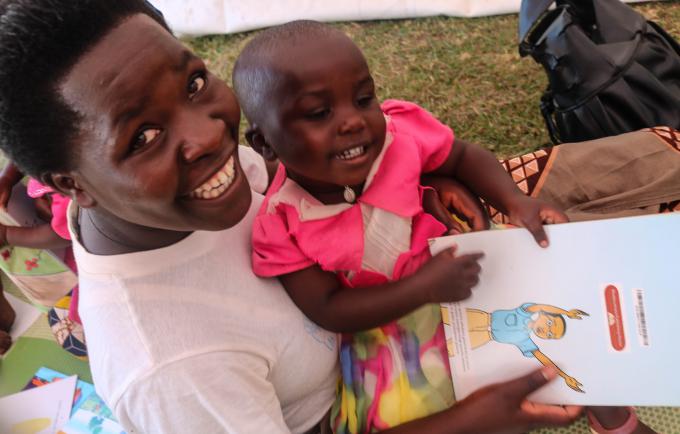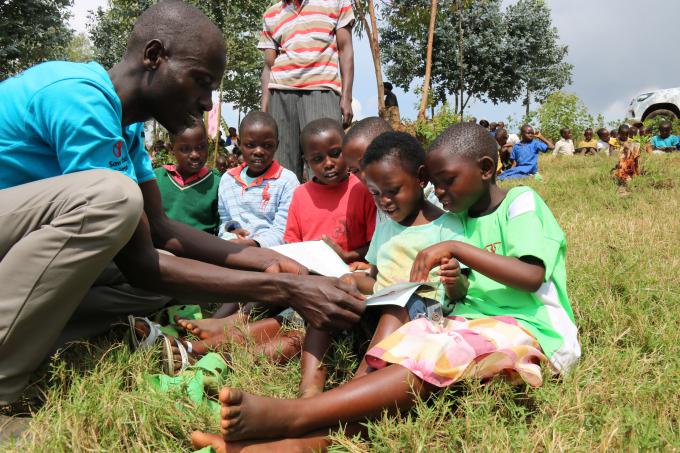First Steps Program Improves Child Learning Outcomes in Rwanda
Save the Children in partnership with Umuhuza (a local NGO) is implementing the First Steps Program in the Districts of Ngororero and Gasabo in Rwanda. The program targeting parents with children aged 0-3 years aims to determine the most feasible and cost-effective approach to delivering parenting education for the Rwanda context and as well identify effective ways of achieving improvements in parenting practices, child development indicators, and emergent literacy promotion.

Uwitonze Yohani Mariko, 33 years, participated in the First Steps program. He points out that his attitude towards the program changed as he started supporting his wife to pursue the program sessions.
“Before I was not interested in supporting my wife in raising our children. Sometimes, I would prevent her from attending the trainings. She didn’t give up and would consistently continue to explain to me what they were learning and the advantages of attending the sessions. After much explanation I got convinced and when I joined the program, it changed my mindset. I now read, play and sing together with my children every day. I am happy with the contribution I have made towards my community as well as changing the mindset of my fellow men in regards to supporting their children from an early age,” said Uwitonze.
Findings from a research conducted in Ngororero District by Save the Children and partners indicate that, mothers who received the basic package of the training invested 41% more time in learning activities while mothers who received a full package of training and materials invested 52% more time than those who didn’t. The research also shows that men who received the basic package of the intervention increased their investment in learning activities with children by 81% in the short-term and 32% in the medium-term.
“We are delighted to share the findings from the research which showed that parents who received parenting trainings had positive and significant impact on time investment on increasing practices of engaging in caregiver-child activities, such as singing, telling a story, playing with toys, reading and naming objects," said Analo Patrick, Acting Country Director, Save the Children Rwanda.
Abdul Kalim Ndimurwango, is another parent who participated in the First Steps parenting sessions in Gasabo District. Later, he became a trainer after observing that there are many families who do not know how to care for their children. “I didn’t know that a child needs parental care even when they are still in their mother’s womb. It is not only me, but so many other parents, especially husbands have this understanding. In the trainings, we got to know that caring for a baby begins from conception” says Abdul.
“My last born Gisa is very bright. He is still very young but does things that I didn’t see his brothers doing when they were still his age. I think he will be very intelligent. We started caring for him when he was still in his mother’s womb. This came after attending First Steps trainings which opened my mind. Every day I have to find time for him. I read books and play with him. We have become good friends,” he adds.
In her remarks, Dr. Anita Asiimwe, the Rwanda National ECD Program Coordinator noted: "It takes a village to raise a child. We know that parents/families are the key stakeholders in child development. We need to work together and ensure all our children grow healthy. It requires collective efforts and collaboration from leaders and partners to parents."
In the recent Global Childhood report by Save the Children, Rwanda was ranked as the biggest mover of change for improving children’s lives in the region and the second-biggest in the world showed. However, it is clear that there is more to do to protect and support children in their early years. The Rwanda Demographic and Health Survey (RDHS) 2014-15 reported that 63% of children age 3-5 are developmentally on track in at least 3 of 4 domains; however, only 7% of children age 3-5 are developmentally on track in literacy-numeracy. These figures are even lower for those in rural areas, poorer households and children of less educated parents.
 Rwanda
Rwanda 